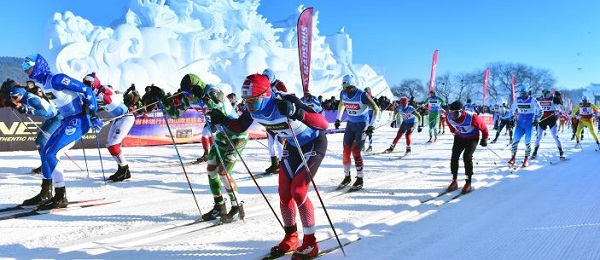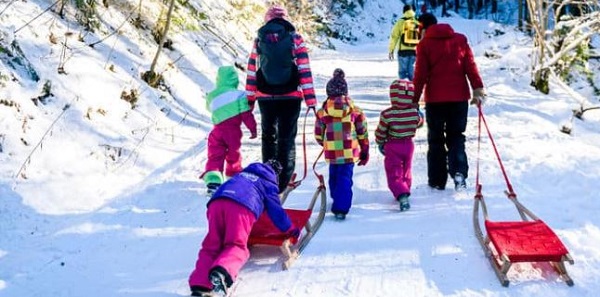The Winter Tourism

St. Moritz, Switzerland became the cradle of the developing winter tourism in the 1860s: hotel manager Johannes Badrutt invited some summer guests from England to return in the winter to see the snowy landscape, thereby inaugurating a popular trend. It was, however, only in the 1970s when winter tourism took over the lead from summer tourism in many of the Swiss ski resorts. Even in winter, up to one third of all guests (depending on the location) consist of non-skiers.
Major ski resorts are located mostly in the various European countries (e.g. Andorra, Austria, Bulgaria, Bosnia-Herzegovina, Croatia, Czech Republic, Cyprus, Finland, France, Germany, Greece, Iceland, Italy, Norway, Latvia, Lithuania, Poland, Romania, Serbia, Sweden, Slovakia, Slovenia, Spain, Switzerland, Turkey), Canada, the United States (e.g. Montana, Utah, Colorado, California, Wyoming, Vermont, New Hampshire, New York) Argentina, New Zealand, Japan, South Korea, Chile, and Lebanon..
Recent developments
There has been an up-trend in tourism over the last few decades, especially in Europe, where international travel for short breaks is common. Tourists have a wide range of budgets and tastes, and a wide variety of resorts and hotels have developed to cater for them. For example, some people prefer simple beach vacations, while others want more specialized holidays, quieter resorts, family-oriented holidays, or niche market-targeted destination hotels.
The developments in air transport infrastructure, such as jumbo jets, low-cost airlines, and more accessible airports have made many types of tourism more affordable. A major factor in the relatively low cost of air travel is the tax exemption for aviation fuels. The WHO estimated in 2009 that there are around half a million people on board aircraft at any given time. There have also been changes in lifestyle, for example, some retirement-age people sustain year-round tourism. This is facilitated by internet sales of tourist services. Some sites have now started to offer dynamic packaging, in which an inclusive price is quoted for a tailor-made package requested by the customer upon impulse.
There have been a few setbacks in tourism, such as the September 11 attacks and terrorist threats to tourist destinations, such as in Bali and several European cities. Also, on 26 December 2004, a tsunami, caused by the 2004 Indian Ocean earthquake, hit the Asian countries on the Indian Ocean, including the Maldives. Thousands of lives were lost including many tourists. This, together with the vast clean-up operations, stopped or severely hampered tourism in the area for a time.
Individual low-price or even zero-price overnight stays have become more popular in the 2000s, especially with a strong growth in the hostel market and services like CouchSurfing and airbnb being established. There has also been examples of jurisdictions wherein a significant portion of GDP is being spent on altering the primary sources of revenue towards tourism, as has occurred for instance in Dubai.
The terms tourism and travel are sometimes used interchangeably. In this context, travel has a similar definition to tourism but implies a more purposeful journey. The terms tourism and tourist are sometimes used pejoratively, to imply a shallow interest in the cultures or locations visited. By contrast, traveler is often used as a sign of distinction. The sociology of tourism has studied the cultural values underpinning these distinctions and their implications for class relationsç
Discover More About Tourism

Tourism is travel for pleasure or business; also the theory and practice of touring, the business of attracting, accommodating, and entertaining tourists, and the business of operating tours. The World Tourism Organization defines tourism more generally, in terms which go "beyond the common perception of tourism as being limited to holiday activity only", as people "traveling to and staying in places outside their usual environment for not more than one consecutive year for leisure and not less than 24 hours, business and other purposes". Tourism can be domestic (within the traveller's own country) or international, and international tourism has both incoming and outgoing implications on a country's balance of payments.
Tourism numbers in 2000s recession
Tourism numbers declined as a result of a strong economic slowdown (the late-2000s recession) between the second half of 2008 and the end of 2009, and in consequence of the outbreak of the 2009 H1N1 influenza virus, but slowly recovered until the COVID-19 pandemic put an abrupt end to the growth. The United Nations World Tourism Organization estimated that global international tourist arrivals might decrease by 58% to 78% in 2020, leading to a potential loss of US$0.9–1.2 trillion in international tourism receipts..
International Tourism Affected in 2020
Globally, international tourism receipts (the travel item in balance of payments) grew to US$1.03 trillion (€740 billion) in 2005, corresponding to an increase in real terms of 3.8% from 2010. International tourist arrivals surpassed the milestone of 1 billion tourists globally for the first time in 2012, emerging source markets such as China, Russia, and Brazil had significantly increased their spending over the previous decade.
Global tourism 2020
Global tourism accounts for c. 8% of global greenhouse-gas emissions, as well as other significant environmental and social impacts that are not always beneficial to local communities and their economies. For this reason, many tourist development organizations are beginning to focus on sustainable tourism in order to mitigate negative effects caused by the growing impact of tourism. The United Nations World Tourism Organization emphasized these practices by promoting tourism as part of the Sustainable Development Goals, through programs like the International Year for Sustainable Tourism for Development in 2017, and programs like Tourism for SDGs focusing on how SDG 8, SDG 12 and SDG 14 implicate tourism in creating a sustainable economy.






 |
|  |
|  |
|  |
| 